Tips & Advice
The magic of Maldives on Lonubo

Maldives.net.mv – Capturing the essence of the Maldives; Maafushivaru is your getaway for ultimate seclusion. Set in the South Ari Atoll of the Maldives; this gem of an island bestows memorable experiences in its bare, intimate setting. Lonubo its ‘twin island’is a desert island escape, exclusively for the use of Maafushivaru guests, and your key to ultimate seclusion.
What makes Lonubo so special isn’t just the sweeping wide beaches, and the sparkle of the expansive Indian Ocean. Its tiny stature conceals vast experiences on offer. You can join the complimentary daily transfers, in the morning or afternoon, take in some sun on private stretch of the beach or explore the Lonubo house reef and meet the many animals living underneath. Alternatively you can take out a pedalo or a kayak and go around this gem, or pedal between these two islands. Organise a fun picnic under the warmth of the Maldivian sun or engage in couple spa treatments with the sound of the waves and the rhythmic swaying palm as your background music.
Dine on the beach under a canopy of stars with its delectable five course menu. Choose to slumber afterwards in its cosy villa, spending the night on the island all by yourself. Wake up to breakfast served in your villa, at your preferred time and while away the morning’s sun soaked hours snorkeling, Several times a week, set inside a ‘Dhoni’ or a Maldivian boat, you can enjoy tropical cocktails with fiery sunsets in the backdrop, and continue on to dinner with a menu that features our best grills.
Yes, that is Lonubo. Feel its magic and succumb for a slice of Maldives in simplistic authenticity.
Tips & Advice
Flying after scuba diving: Essential guidelines for safe travel

Scuba diving in the Maldives offers an unparalleled experience, with its vibrant coral reefs, diverse marine life, and crystal-clear waters. However, one crucial aspect that divers must consider is the timing of their flights after diving. Understanding the recommended waiting periods before flying is essential to ensure safety and prevent decompression sickness. Here’s what you need to know.
Understanding Decompression Sickness
Decompression sickness, also known as “the bends,” occurs when nitrogen bubbles form in the bloodstream and tissues due to rapid changes in pressure. This can happen if a diver ascends too quickly or flies too soon after diving. The reduced cabin pressure in an airplane can exacerbate the formation of these bubbles, leading to serious health risks.

Recommended Waiting Times
The waiting time before flying after scuba diving depends on the type and number of dives completed. Here are the general guidelines:
- Single Dive: If you have completed a single, no-decompression dive, it is recommended to wait at least 12 hours before flying. This allows sufficient time for the body to eliminate excess nitrogen.
- Multiple Dives or Multiple Days of Diving: For divers who have completed multiple dives or have been diving over several days, the recommended waiting period extends to 18 to 24 hours. This longer duration helps ensure that nitrogen levels in the body have decreased to safe levels.
- Dives Requiring Decompression Stops: If your dive profile included decompression stops, it is crucial to wait at least 24 to 48 hours before boarding a flight. Decompression dives involve higher nitrogen absorption, necessitating a longer off-gassing period.
Seaplane and Domestic Flights
Many tourists visiting resorts and other islands in the Maldives travel by seaplane or domestic flights. While these flights generally operate at lower altitudes compared to international flights, the same waiting time guidelines apply. The reason is that even at lower altitudes, the risk of decompression sickness remains significant due to the changes in pressure.
Practical Tips for Divers
- Plan Your Dives and Flights: When planning your diving trip, consider your flight schedule. Ensure that you have ample time between your last dive and your flight to adhere to the recommended waiting periods.
- Stay Hydrated: Proper hydration can aid in the elimination of nitrogen from the body. Drink plenty of water before and after your dives.
- Monitor Your Health: Pay attention to any symptoms of decompression sickness, such as joint pain, dizziness, or difficulty breathing. If you experience any of these symptoms, seek medical attention immediately.
- Use Dive Computers: Modern dive computers can help track your nitrogen levels and provide personalized recommendations for safe flying times based on your dive profile.
Flying after scuba diving requires careful consideration and adherence to safety guidelines to prevent decompression sickness. By following the recommended waiting times and taking necessary precautions, divers can enjoy their underwater adventures in the Maldives and travel safely. Always consult with dive professionals or medical experts if you have any concerns about your health and safety.
Culture
Palace for the prince: Muleeage’s century-long journey through history

It was ‘honeymoon season’ in Suez. Sultan Haji Imadudeen was reigning on a throne of love in Egypt. But back home, those were darker times, as Maldives continued to borrow from Bohra merchants of Mumbai. After all, the wedding expenses of the monarch had to be paid by the state.
Imadudeen has appointed his younger brother, Dhoshee Manippulhu of Maandhooge, as the regent to take care of the state’s affairs, but it was Prince Ibrahim Dhoshimeynakilegefaan of Athireege who ruled. Prince Ibrahim’s son, Abdul Majeed Didi of Athireege, took charge of stabilising the nation.
Backed by the British masters and business elites in Male’, Abdul Majeed Didi began hatching a secret plan. Finally, by the early hours of March 10, 1910, onlookers could understand that something was happening in Muleege. Beeru Mohamed Fulhu, who was at the Friday Mosque, saw the door being opened and Mohamed Shamsudeen being escorted out by his brother-in-law Abdul Majeed Didi and Sayyid Kilegefaanu, also known as Khatheeb Seedhi. The two men accompanied Shamshudeen to Boduganduvaru, the royal palace, and placed him on the throne as Sultan Shamsudeen Iskandhar, Al-Salitc. As Shamsudeen was the brother-in-law of both men, the aim behind the plan could mean more than just stabilising the nation; there might have been personal motives and interests.
After appointing Shamsudeen the sultan, Khatheeb Seedhi told him that no one was ever going to challenge his reign. He said that Shamshudeen was not going to leave the throne unless he wished to do so.
Khatheeb Sidi’s saying became true, as Shamsudeen remained in power for the next 31 years, six months and 28 days. That was until he left behind all the privileges of a king for the sake of his beloved son Hassan Izzuddeen, for whom he built Henveyru Ganduvaru or Muleeage from where he started his journey to become the sultan at one midnight. As the famous public speaker and poet Ibrahim Shihab later said, the sultan abdicated for the only son he ever had.
Muleeage, the presidential palace which is now 105 years old, was originally built for Shamsudeen’s son and the then Crown Prince Hassan Izzudeen. The palace was originally named as Henveyru Ganduvaru. It was a symbol of the king’s love for his son.
The origin of this address goes back to the era of the heroic Sultan Hassan Izzudeen, also known as Dhonbandaarain. This plot of land was first used to build a thatch hut when Muhammad Manik of Mulee shifted his family to the capital city. The house was later inherited by Dhonbandaarain and then by Ibrahim Noorahdeen and then by his son Shamsudeen. Hassan Izzudeen was born to Shamsudeen and Sithi Didi, daughter of Bodu Sidi of Kalhuhurage.
When Izzudeen was studying in Ceylon, Shamsudeen decided to build the house before his son returned home. Shamsudeen decided to build it as a palace for the crown prince.
Fully funded by state coffers, the project was commissioned in 1914. Ahmed Dhoshimeyna Kiligefaanu of Athireege was assigned as the project manager. Architects and builders were brought from Ceylon. Architecture and the design was that of the Victorian era with a touch of colonial architectural design. Furniture too was imported from Ceylon. Few transoms were designed by Easa Mohamed Fulhu from the island of Kela in Haa Alif Atoll.
The palace was opened on December 7, 1919, with a special Mauloodh, a cultural prayer.
Izzudeen came back from Ceylon after his education to live in the palace as “Henveyru Ganduvaru Manippulhu”. He lived with privileges that don’t match with that of any other prince. As he was a highly-skilled musician, the palace became a theatre for music. Izzudeen sang with his beautiful voice whilst also playing harmonium. Boys of his dance group, widely known as “Nashaa Party” danced to his music, dressed as ladies. Boduberu too was part of the fun at the palace. It was full on partying till midnight on most days. It is said that the novel, Dhonthuhkalaage Gellunu Furaavaru (lost teenage of Dhonthuhkala), written by Muhammad Ismail Didi of Meerubahuruge, was based on an incident that happened at the palace.
The elite of Athireege took all that as inappropriate for a crown prince. Their disapproval grew and Izzudeen was considered as someone who is ineligible for the throne. The first written constitution in the history of Maldives was passed as a result. It was written in that constitution that the sultanate will only go to a grandson of Dhonbandarain, effectively removing Izzudeen from the royal inheritance path.
But the constitution was later received by the people as a burden, as new laws were introduced to a population that was not aware of such rules. It made their life miserable.
“We can’t bear this anymore,” they said, as they gathered at the Gulhakulhey Fasgandu, an open area just next to the headquarters of the army, and tore apart the document. They even attempted to bring out some ministers to be dealt with by the mob.
The country then saw increased hostile actions against the government from Izzudeen who tried to take over.
Prime Minister Hassan Fareed issued orders to arrest Izzudeen’s allies. Izzudeen went to Bodubandeyrige, then headquarters of security forces, in person to try save his allies. Shamsudeen left the throne to follow.
The prime minister, who was paving way for the change in government, used this as an opportunity to overthrow Shamsudeen. The latter was banished to Fuvahmulah, in the far south, together with his son Izzudeen.
Izzudeen died on the island after a short ailment, whilst Shamsudeen was brought back to Male’ as his health deteriorated. He died shortly thereafter. Henveyru Ganduvaru was deserted after that.
All the palaces except that of the sultan were later downgraded and Henveyru Ganduvaru became Muleeage, taking the name of the first house built at the address.
Muleeage was used for several purposes for the next 80 years before becoming the presidential palace in 1953. From 1942 to 1947, it was used to house the ministries of home affairs and defence, and the office of the head of intelligence. It also served as the headquarters of the first newspaper in the country, Sarukaaruge Khabaru.
With the first republic that came into being in 1953, Muleeage became the presidential palace, serving as the official residence of Mohamed Ameen Didi, the first president.
As the monarchy was reinstated after overthrowing Ameen and abolishing the republic in a coup, Muleeage became the office of the prime minister. Ibrahim Famuladeyrikiligefaan and Ibrahim Nasir were prime ministers who used the office. At one point during their administrations, Muleeage also housed the ministry of defence.
Presidential palace and several ministries at some point, Muleeage has been in use ever since.
Apart from this, several high profile guests of the state stayed there during their visits. Late Queen Elizabeth and her late husband, The Duke of Edinburgh Prince Philips were amongst those.
Although Ibrahim Nasir, as the first president of the second republic, declared Muleeage as the presidential palace again in 1970, he didn’t use it as such. His successor, Maumoon Abdul Gayoom, was the first president to formally use it as his official residence. He stayed there from 1988 to 1994, before moving to Theemuge, a newly built presidential palace which later became the Supreme Court.
The first Supreme Court, which was the result of the present day constitution, was temporarily housed in Muleeage in 2008. Then came President Mohamed Nasheed who chose to make it the presidential palace yet again. It was also used as the offices of a national inquiry commission, which was setup to investigate the events surrounding Nasheed’s early departure in 2012, before becoming the presidential palace again.
In the century that has passed since Muleeage was built in its current design, it has witnessed numerous historical events in the country. It witnessed the declaration of the first republic and the reinstating of the monarchy. It hosted heads of states as well as ministers from different parts of the world. Indian Prime Minister Rajiv Gandi was one amongst them to be remembered.
Been a place for all that, the status of Muleeage is much more important in our history; it was the childhood home of Hassan Izzudeen, Dhonbandaarain, the heroic sultan who freed Maldives from the short-lived rule of the Malabari invaders, also known as “Holhin”. This was the place from where he came out for his battle with the flag of freedom flying over his head.
Tips & Advice
Protecting your Maldives vacation: How to avoid ticket and holiday scams during the holiday season

Maldives with its pristine beaches and crystal-clear waters, is a dream destination for many tourists seeking a tropical paradise. However, with the rise of cyber threats targeting travelers, it’s crucial for tourists to be vigilant and protect themselves from ticket scammers. Cybersecurity experts have warned that fake ticket and holiday package sellers are becoming more active during the holiday season, preying on unsuspecting travelers. Here we will look into the tactics scammers use and offers tips on how tourists can avoid falling victim to these scams.
The Ticket Scam Threat:
As the holiday season approaches, hackers capitalize on the increased demand for plane tickets and holiday packages. They use stolen or hacked credit card details to purchase plane tickets or holiday packages and then offer these tickets at seemingly irresistible prices through phishing websites that may appear legitimate. Adrianus Warmenhoven, a cybersecurity expert at NordVPN, emphasizes that scammers take advantage of individuals who let their guard down due to the perceived high cost of secure options.
The Consequences of Falling Victim:
Once a traveler falls for the scam and purchases a fake ticket or holiday package, they receive a booking confirmation and often remain unaware of the deception until the day of travel. At this point, they may discover that their booking has been canceled by the real ticket owner or the credit card company, leaving them stranded at the airport with no recourse for a return flight.
Protecting Yourself from Ticket Scams:
Adrianus Warmenhoven provides valuable tips for tourists to protect themselves from ticket scams and ensure a secure and stress-free holiday in the Maldives:
- Beware of Too-Good-To-Be-True Prices:
- If a ticket price seems too good to be true, it probably is. Scammers lure victims with unrealistically low prices obtained by stealing money from other people.
- Exercise Caution with Last-Minute Deals:
- Hackers aim to sell tickets quickly before the legitimate cardholder cancels the transaction. Be skeptical of last-minute deals and thoroughly verify their authenticity.
- Identify Phishing Websites:
- Scrutinize websites for grammar mistakes, flashy ads, or poor design. Hackers often cut corners on these details. Consider using cybersecurity tools like NordVPN’s Threat Protection to help identify phishing websites.
- Buy from Trusted Distributors:
- Whether purchasing tickets directly from an airline or through a distributor, choose well-known platforms with positive user reviews. Avoid unfamiliar or dubious sellers to minimize the risk of falling victim to scams.
- Contact Service Providers for Verification:
- If you suspect you may have purchased a fake ticket, promptly contact the service provider using the email or phone number listed on their official website. Verify the legitimacy of your booking to avoid any travel disruptions.
As you plan your dream vacation to the Maldives, staying vigilant against ticket scams is crucial. By following these tips and being cautious online, tourists can protect themselves from falling victim to scammers and ensure a safe and enjoyable holiday experience in this tropical paradise. Remember, a little extra caution can go a long way in safeguarding your vacation memories.
-
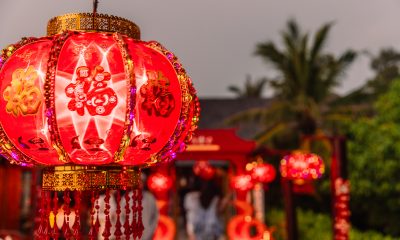
 Featured1 week ago
Featured1 week agoYear of the Horse celebrations across Sun Siyam’s Luxury, Privé and Lifestyle resorts
-
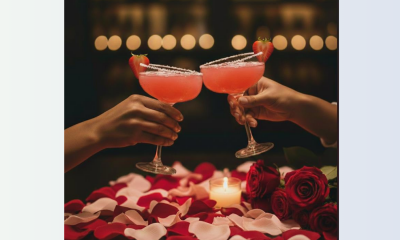
 Love1 week ago
Love1 week agoAzur rooftop at JEN Maldives sets stage for Valentine’s Day dining
-
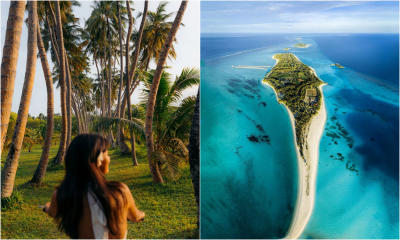
 Awards1 week ago
Awards1 week agoVilla Park secures second straight HolidayCheck Award
-
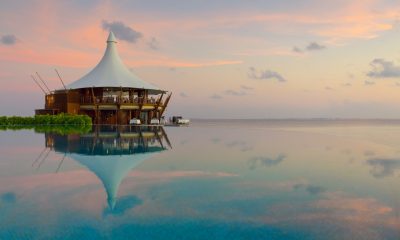
 Cooking1 week ago
Cooking1 week agoBaros Maldives’ The Lighthouse to present Duval-Leroy champagne pairing experience
-

 Action1 week ago
Action1 week agoLUX Tennis joins St. Regis Maldives Vommuli to expand active lifestyle programme
-
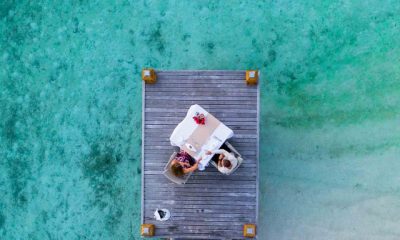
 Love1 week ago
Love1 week agoKandooma Maldives invites couples to gift island escape this Valentine’s Day
-
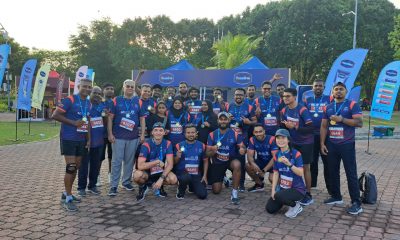
 Action6 days ago
Action6 days agoBestbuy Maldives supports health, wellness as Main Sponsor of MNU Marathon 2026
-
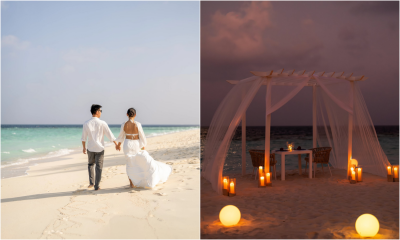
 Love6 days ago
Love6 days agoRomance in nature: Valentine’s week at Eri Maldives










